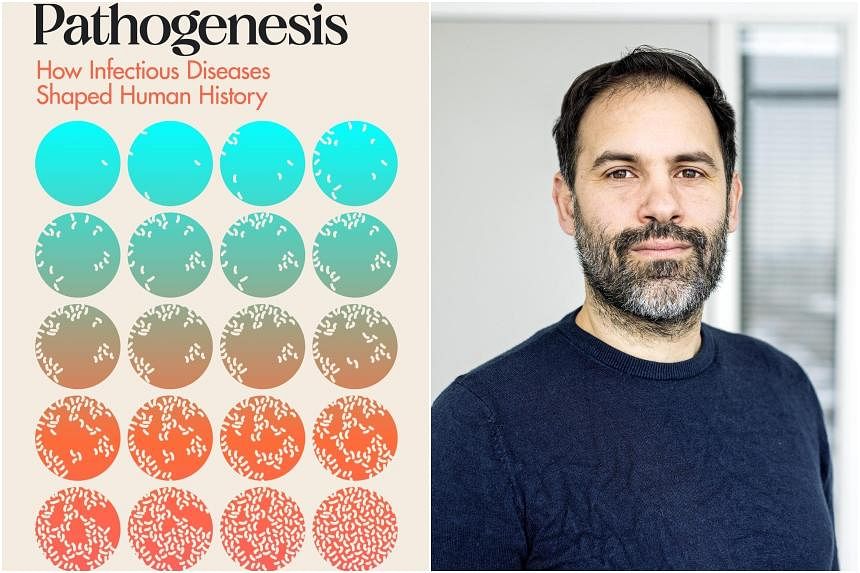
Pathogenesis: How Germs Made History
By Jonathan KennedyNon-fiction/Torva/Paperback/375 pages/$30.47/Amazon SG (amzn.to/3sL4IsS)
4 stars
Microbes – not mankind – make history.
This is the ambitious argument that Pathogenesis mounts as it takes the reader through a whirlwind tour from infectious diseases of the Palaeolithic age to Covid-19.
The way to treat a book of such aspiration is, first and foremost, to marvel at the bold, eye-opening conclusions that its author, Jonathan Kennedy, synthesises from scientific research; and secondly, to inject a healthy dose of scepticism to the construction of a grand narrative that it is simply a bacteria’s world.
Thankfully, Kennedy – who teaches politics and global health at Queen Mary University of London – is a chatty but serious and completely likeable tour guide who has a knack for simplifying jargon while making social analyses of, and literary allusions to, historical plagues.
He writes that the Neolithic revolution – when human cultures transitioned from foraging to agriculture and settlement – was a golden age for viruses because, for the first time, humans lived in proximity to domesticated animals.
The plague, Hepatitis B and tuberculosis are some examples of Neolithic pathogens that continue to shape the modern world.
Moving to analyses of ancient plagues, Kennedy cites how, according to the Athenian historian Thucydides, Sparta’s victory over Athens in the Peloponnesian war was also helped by the fact that a plague had struck Athens and killed one in four of the city’s population.
Was it pathogens that secured the victory of the conservative, oligarchic and insular Sparta over the democratic and culturally resplendent Athens, thus shaping the course of human political systems thereafter? Kennedy makes this tempting speculation in his book, but it is precisely in these moments that a reader must guard against generalisations.
It is perhaps a better known fact that the European colonisation of the Americas introduced a host of deadly diseases such as smallpox and measles. A disease referred to as cocoliztli (Nahuatl for “pestilence”), for example, killed up to 80 per cent of the region’s inhabitants in 1545 – one of the deadliest epidemics in history.
It turns out that the reason bacteria flowed only one way – the effect was not similarly disastrous for the European invaders – was Europe’s Palaeolithic ancestors had developed certain forms of immunity, and not some divine right for European colonisation as New England’s settlers were wont to think.
In tropical Africa, however, infectious diseases continued to pose a threat to European colonisers, which leads Kennedy to conclude: “The region attracted ambitious and unscrupulous Europeans motivated by making as much money in as little time and with as small a capital expenditure as possible – and then cutting and running before they were struck down by disease.”
Pathogenesis is full of such fascinating research and theories that draw a grand history of Palaeolithic, Neolithic, ancient, mediaeval, colonial, industrial and capitalist plagues to make the case that microbes are the biggest movers of history.
After all, there are an estimated one trillion types of bacteria and archaea, compared with 8.7 million species of animals, plants and fungi on the planet. Only one of them is Homo sapiens.
One limitation of the book, however, is that despite trying to escape from the human-centric study of history, it is ultimately still a Eurocentric history of the world.
Pathogenesis mainly ventures outside of Europe to touch on European colonialism; its most rigorous example outside of Europe is only China in the 20th century and comes a tad too late for a book that stretches back to prehistory.
Nevertheless, it presents a solid and intriguing story that might inspire historians and scholars of other regions to fill in its blanks or nuance its claims.
For those looking for a history book that puts the world back to scale, Pathogenesis is a lively reminder that humans are simply a small part of natural history.
If you like this, read: Imperial Creatures: Humans And Other Animals In Colonial Singapore, 1819-1942 by Timothy P. Barnard (NUS Press, 2019, $29.18, Amazon SG, go to amzn.to/49ROChJ). In a similar move, although performed at a different scale, this book examines the history of colonial Singapore through the lens of local fauna.
Get a Black Friday promo code for your book buys on Amazon.sg
Jumpstart your gift shopping for the Christmas season.
If you like the books The Straits Times has reviewed, we have a promotion code with Amazon.sg that will snag you additional discounts for your book buys. From Nov 24 to 27, get $10 off with $80 minimum spend.
Go to amzn.to/3QVSLd4 for this exclusive Black Friday deal. Limited redemptions are available every day, so fastest fingers first.
News Related-
Book Box: A new take on perspectives
-
Thomas Erikson accepts being called a pop psychology writer
-
The Straits Times’ Weekly Bestsellers Nov 25
-
Rio police investigate Taylor Swift concert organisers after fan's death
-
In A Hawker Centre: Bridging the generation gap with specialty coffee
-
Black Friday weekend: Deals on mattresses, laptops, smart TVs and more
-
Big-ticket buys expected to drive Black Friday weekend ahead of 2024 GST hike
-
Suede’s Brett Anderson grabs fans’ phones during Singapore concert, scolds them for filming
-
Missing BTS? Walk down memory lane and snag exclusive merchandise at Space Of BTS pop-up
-
Fast Lane: China to make Mini, first Daimler e-truck arrives, BMW starts making new-gen batteries
-
Fifty Fifty are first K-pop girl group to enter Billboard’s year-end Hot 100
-
Chinese court rejects Canadian pop star Kris Wu's appeal
-
Unusual double bill of Puccini’s Gianni Schicchi and a Chinese classic about growing up
-
Hidden treasures in home of Olio jewellery brand co-owner Aashna Singh
